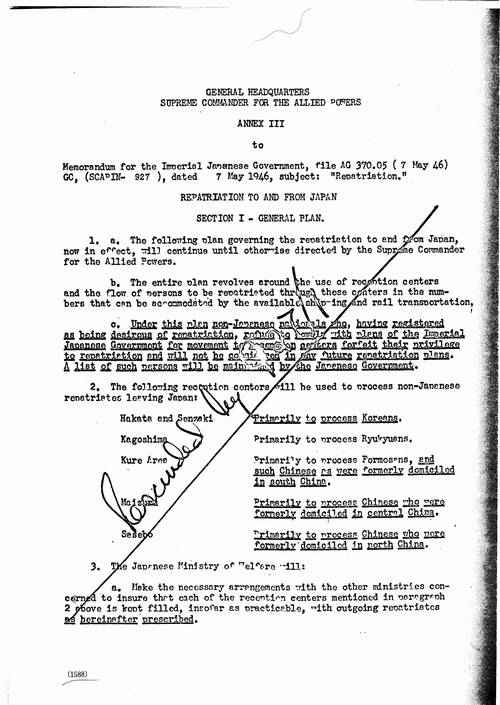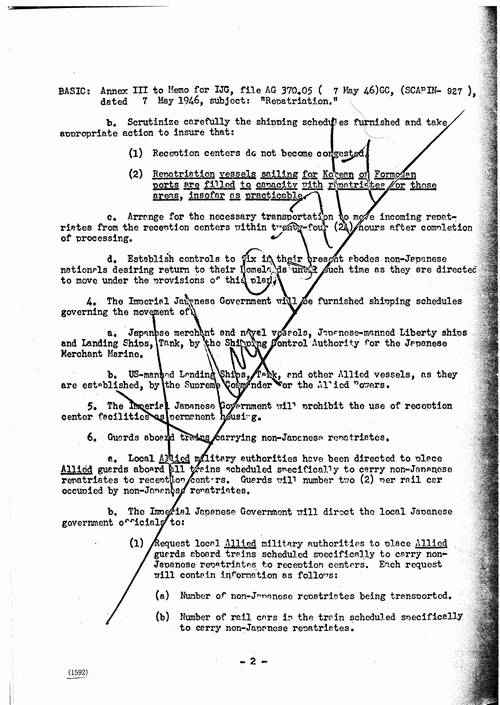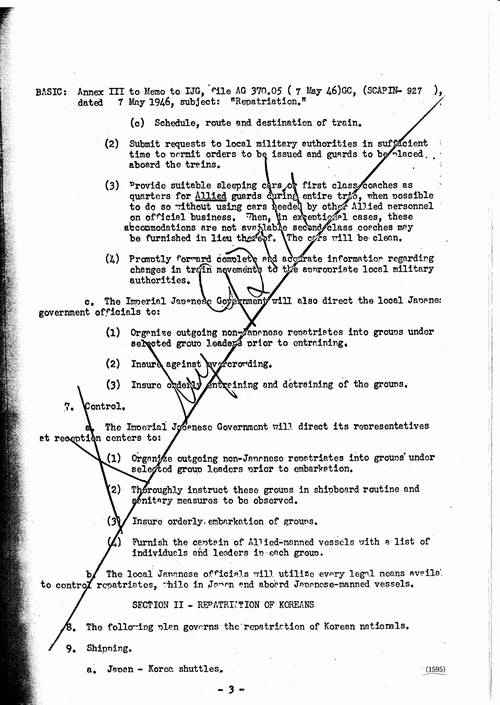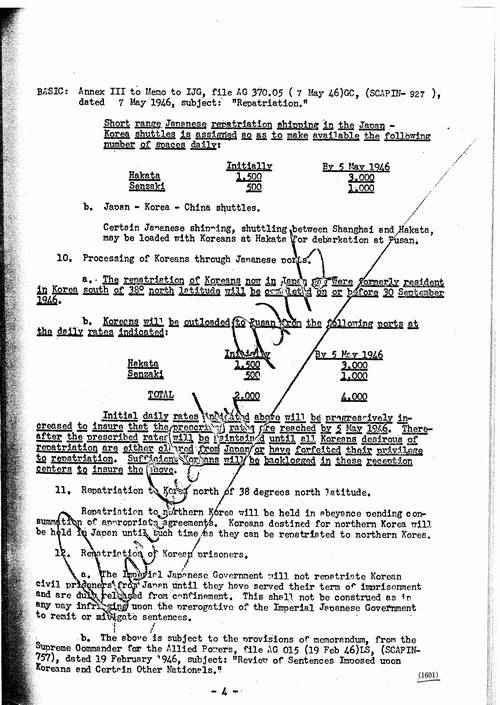SCAPIN927 송환
GENERAL HEADQUARTERS
SUPREME COMMANDER FOR THE ALLIED POWERS
APO 500
7 May 1946
AG 370.05(7 May 46) GC-0
SCAPIN927
MEMORANDUM FOR : JAPANESE GOVERNMENT.
THROUGH : Central Liaison Office, Tokyo.
SUBJECT : Repatriation.
1.This memorandum is the basic directive governing repatriation of:
a.Japanese nationals from areas under the military control of:
Commander-in-Chief, United States Army Forces, Pacific.
Commander-in-Chief, Pacific Ocean Areas.
Generalissimo, Chinese Armies.
Supreme Allied Commander, Southeast Asia Command.
General Officer Commanding, Australian Military Forces.
Commander-in-Chief, Soviet Forces in the Far East (when appropriate agreements have been consummated).
b.Displaced persons in Japan formerly domiciled in China, Formosa, Korea and the Ryukyus.
2.Previous instructions, as contained in the memorandums and radios listed in Annex
SCAPIN927 送還SCAPIN927 送還
GENERAL HEADQUARTERS
SUPREME COMMANDER FOR THE ALLIED POWERS
APO 500
7 May 1946
AG 370.05(7 May 46)GC-0
SCAPIN927
MEMORANDUM FOR : JAPANESE GOVERNMENT.
THROUGH : Central Liaison Office, Tokyo.
SUBJECT : Repatriation.
1.This memorandum is the basic directive governing repatriation of:
a.Japanese nationals from areas under the military control of:
Commander-in-Chief, United States Army Forces, Pacific.
Commander-in-Chief, Pacific Ocean Areas.
Generalissimo, Chinese Armies.
Supreme Allied Commander, Southeast Asia Command.
General Officer Commanding, Australian Military Forces.
Commander-in-Chief, Soviet Forces in the Far East (when appropriate agreements have been consummated).
b.Displaced persons in Japan formerly domiciled in China, Formosa, Korea and the Ryukyus.
2.Previous instructions, as contained in the memorandums and radios listed in Annex Ⅷ hereto, are suspended by this directive.
3.In the future, in so far as practicable, all general directives concerning repatriation to and from the areas listed in paragraph 1 above, will be issued to the Imperial Japanese Government in the form of additions or amendments to this memorandum.
4.The Imperial Japanese Government will carry out the instructions as contained in annexs to this memorandum, under the supervision of the Commanding General, Eighth United States Army.
FOR THE SUPREME COMMANDER:
B.M.FITCH,
Brigadier General, AGD,
Adjutant General.
Annexes:
Annex Ⅰ - General Policies Governing Repatriation of Japanese Nationals in Formerly Japanese Occupied Territory, and Non-Japanese from Japan.
Annex Ⅱ - Reception Centers in Japan for Processing Repatriates.
Annex Ⅲ - Repatriation to and from Japan.
Annex Ⅳ - Supply and Transportation.
Annex Ⅴ - Medical and Sanitary Procedures.
Annex Ⅵ - Currency, Securities, and Other Documents and Possessions.
Annex Ⅶ - Miscellaneous.
Annex Ⅷ - Rescissions.
1.この覚書は送還引揚を制御する基本的指令である
a.下記の軍事支配下からの日本国民の引揚
太平洋米陸軍司令長官
太平洋方面司令長官
中国陸軍総司令官
南東アジア連合国最高司令官
オーストラリア陸軍総司令官
極東ソビエト軍総司令官(適当である協定締結のときに於いて).
b.以前中国、台湾、朝鮮及び琉球に居住し、日本に移された人々の送還
2.この覚書の附則8に列挙した覚書及び無線に含まれるこれまでの指令は、この指示によって取って代えられる
3.将来、実施可能な限り、パラグラフ1aに列挙した地域への、またはその他の地域からの引揚送還に関する一般的指令は、全てこの覚書の追加あるいは修正の形式で日本政府に発せられる
4.日本政府は、米第8軍司令官の監督下において、この覚書附則に含まれる指示を実行すること
附則
附則1 日本軍占領地の日本国民の引揚と、日本からの非日本人送還を規制する一般的方針
附則2 引揚送還者を処理するための日本の地方引揚援護局
附則3 日本への及び日本からの送還
附則4 供給と輸送
附則5 医療、衛生処置
附則6 通貨、有価証券及び他の証書及び所有品
附則7 雑則
附則8 廃止の覚書
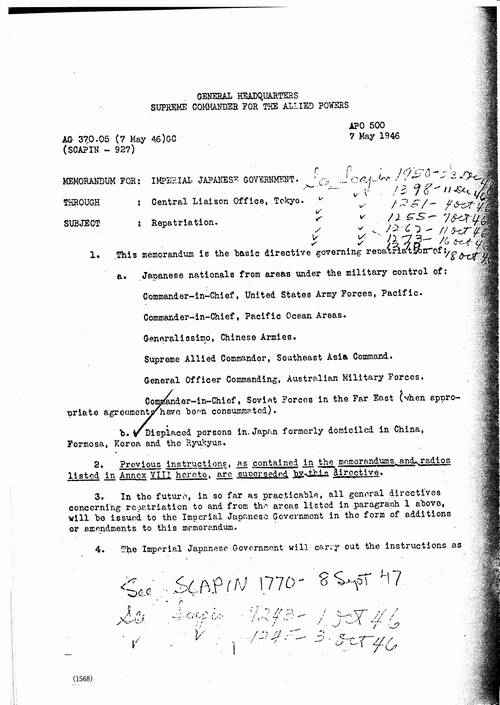
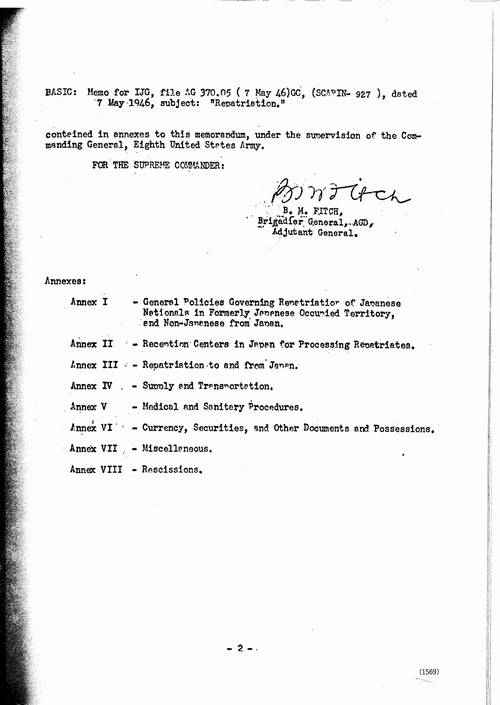
ANNEX Ⅰ
to
Memorandum for the Imperial Japanese Government, file AG 370.05(7 May 46)GC, (SCAPIN-927), dated 7 May 1946, subject: "Repatriation."
GENERAL POLICIES GOVERNING REPATRIATION OF JAPANESE NATIONALS IN FORMERLY JAPANESE OCCUPIED TERRITORY, AND NON-JAPANESE*, FROM JAPAN
The following policies will govern repatriation of Japanese nationals in formerly Japanese occupied territory, and non-Japanese from Japan.*
1.Maximum utilization will be made of Japanese naval and merchant shipping allocated for repatriation of Japanese nationals.
2.Japanese naval vessels and those Japanese merchant vessels, designed primarily for the transport of personnel and not required for inter-island or coastal passenger service, will be utilized for the repatriation of Japanese nationals.
3.Personnel to be repatriated will not be transported on cargo vessels to the extent that the essential cargo is displaced. Repatriates will be transported on cargo vessels destined only for authorized repatriation ports (see paragraph 2a, Annex Ⅱ).
4.The Japanese Government will operate, man, victual and supply Japanese-manned shipping used for repatriation to the maximum practicable extent. In case of emergency, fuel, food, medical supplies and material repairs may be obtained from U.S.Army or Navy sources, or at foreign ports from foreign government sources, by memorandum receipt signed by the master of the vessel concerned (see Annex Ⅳ).
5.First priority will be granted to the movement of Japanese military and naval personnel, and second priority to the movement of Japanese civilians. Exception may be made by the appropriate Allied area commanders as deemed necessary for areas under their control.
6.Only personnel being repatriated to and from Japan under the Japanese repatriation program or such others as may be authorized in special cases by the Supreme Commander for the Allied Powers will be transported on repatriation vessels.
*The term "non-Japanese" as used in this annex and throughout this memorandum includes only Chinese, Formosans, Koreans, and Ryukyuans.
7.Non-Japanese nationals who have been repatriated to their homelands will not be permitted to return to Japan untill such time as commercial facilities are available, except as authorized by the Supreme Commander for the Allied Powers.
8.All Japanese personnel will be disarmed prior to return to Japan proper.
9.The Supreme Commander for the Allied Powers is responsible for making necessary arrangements concerning repatriation with other interested foreign governments.
10.The Supreme Commander for the Allied Powers retains control over, and will make such arrangements as may be required for, the transportation to and reception in Japan of Japanese nationals evacuated from areas under the control of: the Generalissimo, Chinese Armies; the Supreme Allied Commander, Southeast Asia Command; the General Officer Commanding, Australian Military Forces; and the Commander-in-Chief, Soviet Forces in the Far East (the last when appropriate agreements have been consummated).
附則1
日本軍占領地の日本国民の引揚と、日本からの非日本人送還を規制する一般的方針
日本軍占領地の日本国民の引揚と、日本からの非日本人送還は、次の方針によって規制される
1.日本国民の引揚に割り当てられた日本海軍艦艇と商船を最大限に利用すること
2.日本海軍艦艇と商船で、主に旅客輸送にあてられ、内海または沿岸部の輸送に要求されていないものは日本国民の引揚のために利用されること
3.引揚者は、重要貨物の輸送を削減しない程度においてのみ貨物船で輸送すること。引揚者は許可された引揚港(附則2のパラグラフ2aを見よ)に向かう貨物船で輸送すること
4.日本政府は引揚に使用される日本人乗組船舶を実行可能最大限運航し、人員配置、食糧積込、供給をすること。緊急の場合、船舶船長の署名のある受領証によって、燃料、食糧、医療品及び修繕材料を米陸海軍、または外国港では外国政府から得られる
5.日本陸海軍人の移動に第1優先を、民間人の移動に第2優先を与えること。しかるべき連合国地域の司令官がその支配下地域に必要と考えた場合は例外が設けられる
6.日本の引揚計画による日本への引揚者または日本からの送還者、または特別に連合国最高司令官によって許可される引揚者だけが引揚船舶で輸送される
*この附則と覚書を通して使用される「非日本人」という語句は、中国人、台湾人、朝鮮人及び琉球人のみを含む
7.その本国に送還された非日本人は、連合国最高司令官に許可される場合を除き、商業交通が利用できるようになる時まで日本への帰還を許可されない
8.全ての日本人は日本帰還の前に武装解除される
9.太平洋米陸軍司令長官及び太平洋方面司令長官の管轄地域からの日本人引揚に関しては、連合国最高司令官が各地域につき引揚のためだけに割当てられる使用船舶のパーセンテージを指示する
10.連合国最高司令官は、中国陸軍司令官、南東アジア連合国最高司令官、オーストラリア陸軍司令官及び極東ソビエト総司令官(適当である協定締結の時に於いて)の管轄地域から引揚げる日本国民の日本への輸送及び日本における受入に関して、管理を持続し必要な処置を行なうこと
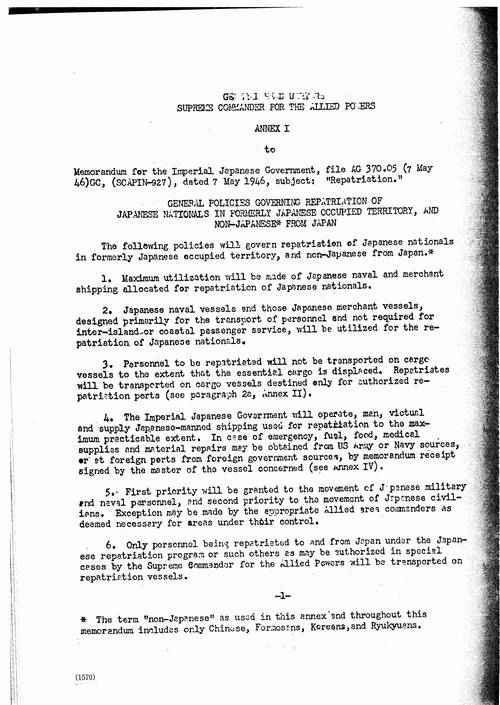
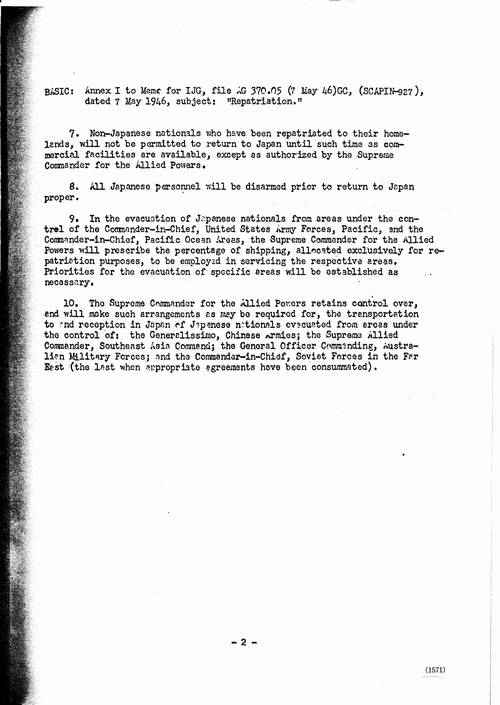
ANNEX Ⅲ
to
Memorandum for the Imperial Japanese Government, file AG 370.05(7 May 46)GC (SCAPIN-927), dated 7 May 1946, subject: "Repatriation."
REPATRIATION TO AND FROM JAPAN
SECTION Ⅰ - GENERAL PLAN
1.a.The following plan governing the repatriation to and from Japan, now in effect, will continue until otherwise directed by the Supreme Commander for the Allied Powers.
b.The entire plan revolves around the use of reception centers and the flow of persons to be repatriated through these centers in the numbers that can be accommodated by the available shipping and rail transportation.
c.Under this plan non-Japanese nationals who, having registered as being desirous of repatriation, fail to comply with the instructions of the Japanese Government for consummation of the their repatriation, forfeit their privilege to repatriation and will not be considered in any future repatriation plans. A list of such persons by name will be maintained by the Japanese Government.
2.The following reception centers will be used to process non-Japanese repatriates leaving Japan:
| |
Hakata and Senzaki |
Primarily to process Koreans |
| |
Kagoshima |
Primarily to process Ryukyuans. |
| |
Kure Area |
Primarily to process Formosans, and such Chinese as were formerly domiciled in south China. |
| |
Maizuru |
Primarily to process Chinese who were formerly domiciled in central China. |
| |
Sasebo |
Primarily to process Chinese who were formerly domiciled in north China. |
3.The Japanese Ministry of Welfare will:
a.Make the necessary arrangements with the other ministries concerned to insure that each of the reception centers mentioned in paragraph 2 above is kept filled insofar as practicable, with outgoing repatriates as hereinafter prescribed.
b.Scrutinize carefully the shipping schedules furnished and take appropriate action to insure that:
(1)Reception centers do not become congested.
(2)Repatriation vessels sailing for Korean or Formosan ports are filled to capacity with repatriates for these areas, insofar as practicable.
c.Arrange for the necessary transportation to move incoming repatriates from the reception centers within twenty-four (24) hours after completion of processing.
d.Establish controls to fix in their presant abodes non-Japanese nationals desiring return to their homelands until such time as they are directed to move under the provisions of this plan.
4.The Imperial Japanese Government will be furnished schedules governing the movement of repatriation shipping as follows:
a.Japanese merchant and naval vessels and other Japanese-manned ships, by the Shipping Control Authority for the Japanese Merchant Marine.
b. US-manned Landing Ships, Tank, and other Allied vessels, as they are established, by the Supreme Commander for the Allied Powers.
5.The Imperial Japanese Government will prohibit the use of reception center facilities as permanent housing.
6.Guards aboared trains carrying non-Japanese repatriates.
a.Local Allied military authorities have been directed to place Allied guards aboard all trains scheduled specifically to carry non-Japanese repatriates to reception centers. Guards will number two (2) per rail car occupied by non-Japanese repatriates.
b.The Imperial Japanese Government will direct the local Japanese Government officials to:
(1)Request local Allied military authorities to place Allied guards aboard trains scheduled specifically to carry non-Japanese repatriates to reception centers. Each request will contain information as follows:
(a)Number of non-Japanese repatriates being transported.
(b)Number of rail cars in the train scheduled specifically to carry non-Japanese repatriates.
(c)Schedule, route and destination of train.
(2)Submit requests to local military authorities in sufficient time to permit orders to be issued and guards to be placed aboard the train.
(3)Provide suitable sleeping cars or first class coaches as quarters for Allied guards during entire trip, when possible to do so without using cars needed by other Allied personnel on official business. When, in exceptional cases, these accommodations are not available second class coaches may be furnished in lieu thereof. The cars will be clean.
(4)Promptly forward complete and accurate information regarding changes in train movements to the appropriate local military authorities.
c.The Imperial Japanese Government will also direct the local Japanese government officials to:
(1)Organize outgoing non-Japanese repatriates into groups under selected group leaders prior to entraining.
(2)Insure against overcrowding.
(3)Insure orderly entraining and detraining of the groups.
7.Control
a.The Imperial Japanese Government will direct its representatives at reception centers to:
(1)Organize outgoing non-Japanese repatriates into groups leaders prior to embarkation.
(2)Thoroughly instruct these groups in shipboard routine and sanitary measures to be observed.
(3)Insure orderly embarkation of groups.
(4)Furnish the captain of Allied-manned vessels with a list of individuals and leaders in each group.
b.The local Japanese officials will utilize every legal means available to control repatriates, while in Japan and aboard Japanese-manned vessels.
SECTION Ⅱ - REPATRIATION OF KOREANS
8.The following plan governs the repatriation of Korean nationals.
9.Shipping.
a.Japan - Korea Shuttles.
Short range Japanese repatiation shipping in the Japan - Korea shuttles is assigned so as to make available the following number of spaces daily:
| |
Initially |
By 5 May 1946 |
| Hakata |
1,500 |
3,000 |
| Senzaki |
500 |
1,000 |
b.Japan - Korea - China shuttles.
Certain Japanese shipping, shuttling between Shanghai and Hakata, may be loaded with Koreans at Hakata for debarkation at Pusan.
10.Processing of Koreans through Japanese ports.
a.The repatriation of Koreans now in Japan who were formerly resident in Korea south of 38゜ north latitude will be completed on or before 30 September 1946.
b.Koreans will be outloaded to Pusan from the following ports at the daily rates indicated:
| |
Initially |
By 5 May 1946 |
| Hakata |
1,500 |
3,000 |
| Senzaki |
500 |
1,000 |
| |
|
|
| TOTAL |
2,000 |
4,000 |
Initial daily rates indicated above will be progressively increased to insure that the prescribed rates are reached by 5 May 1946. Thereafter the prescribed rates will be maintained until all Koreans desirous of repatriation are either cleared from Japan or have forfeited their privilege to repatriation. Sufficient Koreans will be backlogged in these reception centers to insure the above.
11.Repatriation to Korea north of 38 degrees north latitude.
Repatriation to nothern Korea will be held in abeyance pending consummation of appropriate agreements. Koreans destined for northern Korea will be held in Japan until such time as they can be repatriated to northern Korea.
12.Repatriation of Korean prisoners.
a.The Imperial Japanese Government will not repatriate Korean civil prisoners in Japan until they have served their term of imprisonment and are duly released from confinement. This shall not be construed as in any way infringing upon the prerogative of the Imperial Japanese Government to remit or mitigate sentences.
b.The above is subject to the provisions of memorandum, from the Supreme Commander for the Allied Powers, file AG 015 (19 Feb 46)LS, (SCAPIN-757), dated 19 February 1946, subject: "Review of Sentences Imposed upon Koreans and Certain Other Nationals."
附則3
日本への及び日本からの送還
第1部 全体的計画
1.a.現在実施中の日本への及び日本からの送還を規定する計画は、連合国最高司令官から他の指令のない限り継続する
b.本計画は引揚援護局の使用、利用可能な船舶及び鉄道輸送に適合する数量で引揚援護局を通しての送還者の出入に関するものを包括するものである
c.本計画において、送還希望の登録をした非日本人で、日本政府による送還達成のための指示に従うことをしない者は送還の特権を喪失し、また将来の送還計画を考慮されない。それらの者の名簿は日本政府によって作製保存される
2.以下の地方引揚援護局は、日本から離れる非日本人送還者の処理に使用される
| 博多及び仙崎 |
朝鮮人の処理を主とする |
| 鹿児島 |
琉球人の処理を主とする |
| 呉地区 |
台湾人及び以前華南に居住していた中国人の処理を主とする |
| 舞鶴 |
以前華中に居住していた中国人の処理を主とする |
| 佐世保 |
以前華北に居住していた中国人の処理を主とする |
3.厚生省は
a.関係各省と協議し、上記パラグラフ2で言及された援護局を、後で規定される引揚送還者でできる限り満たすのに必要な調節をすること
b.提供される船舶運航スケジュールを慎重に調べ、次の条項を保障するのに適切な行動を取ること
(1)引揚援護局が混雑しないこと
(2)朝鮮または台湾の港に向かう送還船舶は、これらの地域への送還者でできるかぎり収容能力いっぱいに満たすこと
c.引揚送還者を処理終了後24時間以内に援護局から移動させるのに必要な輸送の手配をすること
d.本国帰還を希望する非日本人を、本計画の条項に従った移動を支持するまでの間、現住地にとどめるよう制御すること
4.日本政府には以下の送還船舶の運航スケジュールが提供される
a.日本商船、海軍艦艇及び日本人乗組み戦時標準船と上陸用舟艇(SCAJAPより)
b.米人乗組みの上陸用舟艇及び他の連合国船舶については、それらが有り次第、連合国最高司令官より
5.日本政府は、引揚援護局を住居として使用することを禁止すること
6.非日本人送還者の輸送列車には警護員が乗車すること
a.連合国軍地方官憲は非日本人送還者を引揚援護局に輸送するため特別に計画される全列車に連合国軍警護員を乗車させるよう指令されている。警護員の数は送還者用車両1両につき2名
b.日本政府は地方官憲に以下のように指令すること
(1)非日本人送還者を乗船港へ輸送する予定の全列車に警護員を同乗させるよう連合国軍地方官憲に要請すること。その要請には以下の情報を含むこと
(a)輸送される非日本人送還者数
(b)非日本人送還者を輸送するため特別に計画された列車の車両数
(c)列車運行計画、行路及び目的地
(2)地方官憲に、命令の発出及び警護員の乗車を許可するにじゅうぶんな時間のあるよう要請を提出すること
(3)公務に服する他の連合国人に必要な車両を使用することなく、可能な限り連合国軍警護員用に適当な寝台車または一等客車を全行程を通じて用意すること。例外的な場合として、これらの提供が不可能なときは、代わりに二等客車を提供すること。車両は清潔であること
(4)列車運行の変更に関する完全且つ正確な情報を迅速に適当な地方軍官憲に提出すること
c.日本政府は地方官憲に対して次のように指示すること
(1)国外に向かう非日本人送還者を乗車前にグループに組織し、選ばれたリーダーの下に置くこと
(2)混雑しないよう確実に処置すること
(3)グループの秩序正しい乗降車を確実に処置すること
7.統制
a.日本政府は引揚援護局における代表者に次のように指示すること
(1)国外に向かう非日本人送還者を乗船前にグループに組織し、選ばれたリーダーの下に置くこと
(2)これらグループに対して、守るべき船内習慣及び衛生法規を完全に教えること
(3)グループの秩序正しい乗降船を確実に処置すること
(4)連合国人乗組み船舶の船長に対して各グループの人員及びリーダーの名簿を提供すること
b.日本地方官憲は、送還者が日本にいる間及び日本人乗組み船舶内にいる間、可能なあらゆる法的手段を利用して彼らを取り締まること
第2部 朝鮮への送還
8.以下の計画は朝鮮人の送還を規制するものである
9.船舶
a.日本―朝鮮往復輸送
日本-朝鮮往復輸送に使用の短距離用日本人引揚船は以下の1日平均乗船能力を満たすよう配置されること
| |
当初 |
1946年5月5日まで |
| 博多 |
1,500 |
3,000 |
| 仙崎 |
500 |
1,000 |
b.日本-朝鮮-中国の往復輸送
上海・博多間の往復輸送日本船舶は、釜山で下船する朝鮮人を博多で載せてもよい
10.日本の港を経由する朝鮮人の処理
a.以前北緯38度以南の朝鮮に居住し現在日本に居る朝鮮人の送還は、1946年9月30日またはそれ以前に完了されること
b.朝鮮人は1日あたり次に示された割合で、以下の港から釜山に送出されること
| |
当初 |
1946年5月5日まで |
| 博多 |
1,500 |
3,000 |
| 仙崎 |
500 |
1,000 |
| |
|
|
| 総計 |
2,000 |
4,000 |
上記で示された当初の1日平均送出率を次第に増加させてゆき、1946年5月5日までに規定の送出率に確実に到達させること。それ以降送還希望の朝鮮人が日本からすっかり退去するか、送還の特権を完全に喪失するまでは、規定の送出率が維持されること。上記を確実に履行するためにじゅうぶんな数の朝鮮人を引揚援護局に待機させること
11.北緯38度以北の朝鮮への送還
北部朝鮮への送還は適当な時期に協定が締結されるまで中止される。北部朝鮮に向かう朝鮮人は北部朝鮮への送還が可能になるまで日本に留められる
12.朝鮮人囚人の送還
a.日本政府は朝鮮人囚人が刑期を終了し正当に釈放されるまで送還しないこと。これは刑の判決を取り消し、軽減する日本政府の権限を何らかの意味において侵害するものと解釈されない
b.上記は、1946年2月19日付SCAPIN757「朝鮮人及びその他の国民に言い渡された判決の再審理」の規定に従うものである
